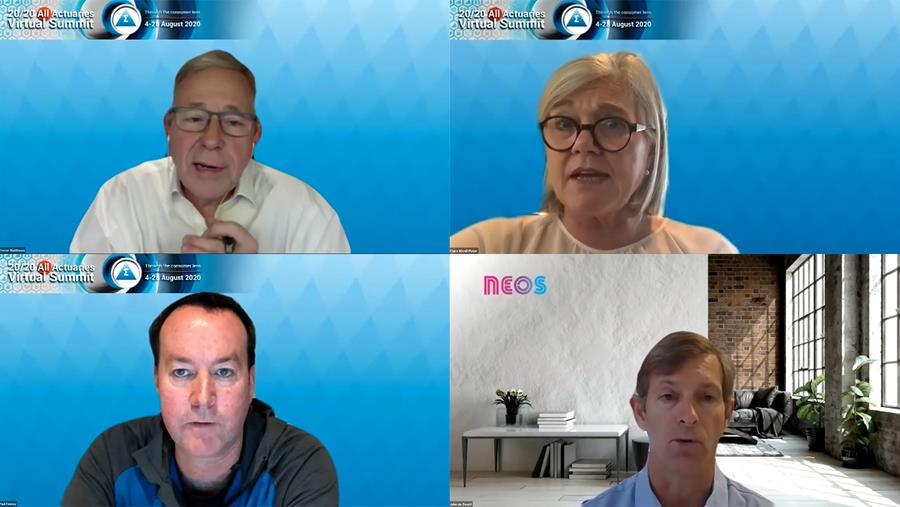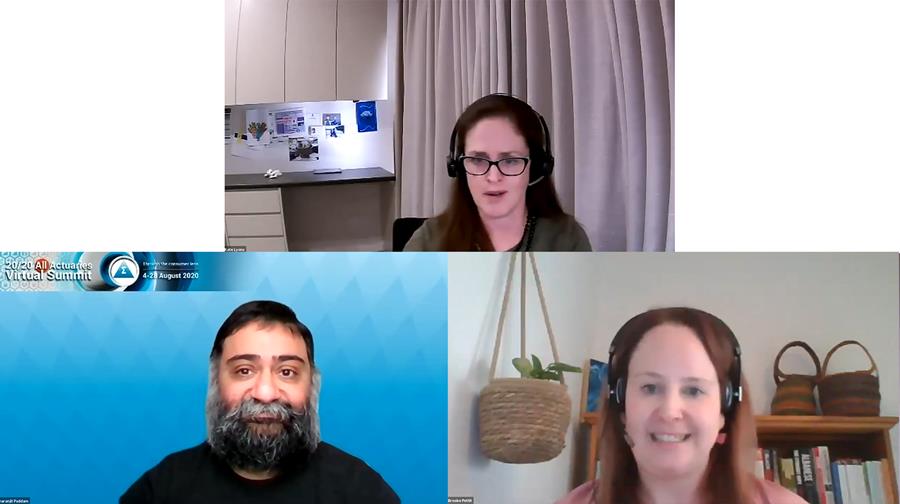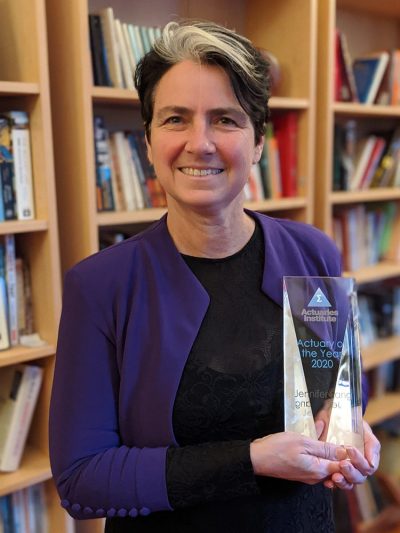
Inaugural Virtual Summit concludes
After four weeks, 67 concurrents and eight plenaries, the 20/20 All-Actuaries Virtual Summit finished last Friday 28 August.
After a strong opening two weeks, weeks three and four of the Virtual Summit highlighted some of the biggest issues faced by society and the profession, with sessions focused on mental health, climate change, the growing intergenerational equity gap, and the future of the actuarial profession. The final fortnight also provided a platform to celebrate the incredible contribution of the profession to society during these uncertain times, highlighted by the presentation of the 2020 Melville Actuaries Summit Prize and the 2020 Actuary of the Year Award.
Week three kicked off with five concurrent sessions, with Jas Singh, Sara Fuller, Ajay Parshotam and Ryan Boyd all adding their perspectives on the state of the profession in the session The Future of the Actuary.
“I still feel that there is still a challenge ahead of us, as the actuarial profession. We need to realise that our technical skills alone is not going to be sufficient for future.”
Ryan Boyd
Following the release of the latest Institute Green Paper, Mind the Gap – The Australian Actuaries Intergenerational Equity Index, authors Hugh Miller and Ramona Meyricke presented on the paper’s key points on Tuesday 18 August. Chaired by Christa Majoribanks, the key takeouts included an outline of the research, the main drivers of the results, and a summary of policy options to address the widening gap.
In week four, the concurrent session Are Actuaries Still Relevant? continued the discussion around the role of the profession and the career opportunities available to current and aspiring actuaries. Presented by Jules Gribble, Lesley Traverso and Caroline Stevenson, the panel reviewed how ‘Continuing Professional Development’ can become more relevant to members and better assist them manage and progress their own learning.
Five plenary sessions took place in weeks three and four.
On Wednesday 19 August, John de Zwart, CEO of NEOS Life, Claire Wivell Plater, Chair of The Fold Legal, and Paul Feeney, Founder of My Map Plan, debated how financial services distribution must evolve in the session Disrupting Distribution.

The panel presented on how their respective organisations are addressing changing customer expectations and the continuous emergence of new technology. This included the strategy of My Map Plan, which focuses on how financial advice should not be provided as a once off static interaction, but as a plan that evolves as an individual’s situation changes.
“Traditional advice is dead on arrival. It’s static, it’s a point in time, it’s looking historically, it’s not the way a plan should be delivered. It really should be a living plan that automatically evolves as an individual’s situation changes.”
Paul Feeney
On Friday 21 August, Brook Pettit (IAG) and Kate Lyons (Suncorp) presented on how financial services are adapting to the physical effects of climate change in Red Hot Issue: Climate Change and the Financial Sector – Part 2: Disclosure in Practice.

The plenary discussion was facilitated by Sharanjit Paddam, former Convenor of the Institute’s Climate Change Working Group.
The basis of the discussion focused on the experiences, challenges and lessons learned by insurers reporting climate-related risks under the Financial Stability Board’s disclosure standard, and what they are doing to manage climate-related risks.
This session concluded the two-part ‘Red Hot’ plenary series, following the part one session held last Friday 14 August.
To commence the Virtual Summit’s final week, Hugh Miller (Taylor Fry) and Sean Carmody (APRA) discussed varying perspectives on the impact of low interest rates both nationally and internationally in the plenary session Losing Interest? What a Low Interest Rate Economy Means for Products, People and Investment, chaired by Melinda Howes.

Hugh highlighted how the Reserve Bank of Australia cash rate has reached a record low of 0.25%.
“The GFC (Global Financial Crisis) saw a big decrease in cash rates in 2008, and the pandemic currently, we’ve seen a big decrease as well. But between those times, we’ve actually seen a continued decreasing rate without a particular crisis or event.”
Hugh Miller
Among the primary reasons behind this continual decline was low inflation, savings and household debt, and ageing and demographics.
On Wednesday 26 August, Tracey Green (RACQ) and John Price (Australian Financial Complaints Authority) discussed the versatility which businesses need to display in order to cater for changing customer needs in the session, chaired by Institute CEO Elayne Grace, How do we Balance Fairness for the Individual Customer with Fairness for all Customers?

Tracey and John each provided examples of how their respective organisations are addressing the needs of the customer, with the Australian Financial Complaints Authority (AFCA) having recently set up the ‘Fairness Project’ to help explain how they go about decision making to assist consumers and industry.
“The key parts of our project are not aimed at regulating or dictating the industry for what they have to do, but to provide a framework and a tool by which the industry can understand how AFCA operates.”
John Price
In the final plenary of the Summit, Anne O’Driscoll and Karen Chester discussed how the ‘under pressure’ financial services industry is working to rebuild community trust in the wake of the Hayne Royal Commission and amid the COVID-19 pandemic in the session Rebuilding Behaviour, Rebuilding Trust, chaired by Estelle Pearson.

Continuing on the Summit’s theme ‘Through the consumer lens’, Karen commenced the discussion by highlighting the key to winning back trust is not simply saying you support a consumer-centric approach, but delivering on the two essential Ds – data and design and distribution obligations.
“I see actuaries really playing an integral role here in the implementation and use of both Ds.”
Karen Chester
With the reputation of financial services having taken a hit post-Hayne, Anne was confident that the trust from consumers could be rebuilt, and that actuaries would play a key role in driving this.
“So, there’s short-term and long-term things that I think actuaries can absolutely contribute to, and be a voice at the table about the risk and, about the long-term profile as well as the short-term, finding the data and pointing out the trends.”
Anne O’Driscoll
Congratulations to the Anti-Discrimination Working Group, 2020 Melville Actuaries Summit Prize winners
On Wednesday 26 August, Chris Dolman, Niki Appleton, Elizabeth Baker and Michael Storozhev presented the concurrent session Actuaries and Discrimination – Report of the Anti-Discrimination Working Group. Anton Kapel, Chair of the session, announced that the Working Group’s paper The Australian Anti-Discrimination Acts: Information and Practical Suggestions for Actuaries, was awarded the 2020 Melville Actuaries Summit Prize.
The judging panel determined that, the paper delivered a true advancement in the profession’s understanding of, and approach to, data-based discrimination and, that all actuaries, whether involved in pricing, data analytics or valuations, should read the paper. It is a very worthy winner of the Melville Prize and a landmark paper in the way we think about our core role as actuaries’. Find out more.

Congratulations to Jennifer Lang, 2020 Actuary of the Year
On the final day of the 20/20 All-Actuaries Virtual Summit, President Hoa Bui was delighted to announce Jennifer Lang as the recipient of the 2020 Actuary of the Year Award in recognition of her leadership of the Institute’s COVID-19 response which has raised the profile and influence of the actuarial profession. Find out more about Jennifer’s valuable contribution to the profession.
CPD: Actuaries Institute Members can claim two CPD points for every hour of reading articles on Actuaries Digital.






